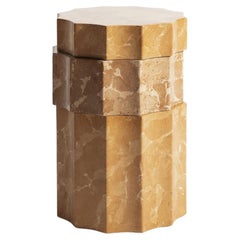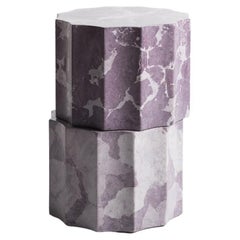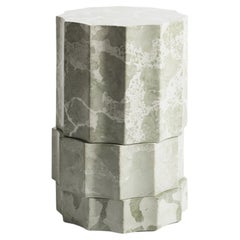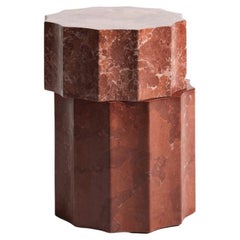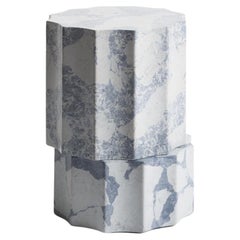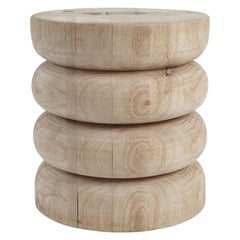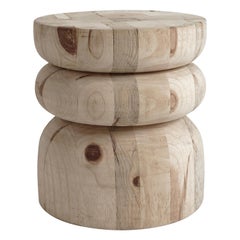Roberto Sironi Stools
5
to
5
5
5
5
5
Height
to
Width
to
Depth
to
5
5
5
21
297
271
148
132
Creator: Roberto Sironi
Domus Pompeii Dioscuri Stool by Roberto Sironi
By Roberto Sironi
Located in Pireaus-Athens, Greece
Rediscovered in 1748, after being buried for almost two millennia under a blanket of lava and ash following the eruption of Vesuvius, Pompeii redefines our relationship with the past
through its generative potential between reality and imagination.
Defined by Goethe “An incredible place, worthy of peaceful thoughts”, Pompeii has the power to transform inanimate archaeological material into narrative matter, merging past and present in a relationship of reciprocity and interaction.
Exploring the site, today as then, it is possible to admire the interiors decorated with frescoes that reproduce architectural partitions or that tell stories of myths and divinities, in rooms set up with marble elements that the owner used to display his most precious objects.
The Pompeian frescoes were made according to different techniques with colors obtained from earth and minerals such as cinnabar (Pompeian red), ochres (Pompeian yellow), by oxidation processes of metals as in the case of cerulean or by the pulverization of roots and animal bones as in case of greens and blacks.
DOMUS POMPEII is a capsule collection of five side...
Category
2010s Roberto Sironi Stools
Materials
Marble
Domus Pompeii Menandro Stool by Roberto Sironi
By Roberto Sironi
Located in Pireaus-Athens, Greece
Rediscovered in 1748, after being buried for almost two millennia under a blanket of lava and ash following the eruption of Vesuvius, Pompeii redefines our relationship with the past
through its generative potential between reality and imagination.
Defined by Goethe “An incredible place, worthy of peaceful thoughts”, Pompeii has the power to transform inanimate archaeological material into narrative matter, merging past and present in a relationship of reciprocity and interaction.
Exploring the site, today as then, it is possible to admire the interiors decorated with frescoes that reproduce architectural partitions or that tell stories of myths and divinities, in rooms set up with marble elements that the owner used to display his most precious objects.
The Pompeian frescoes were made according to different techniques with colors obtained from earth and minerals such as cinnabar (Pompeian red), ochres (Pompeian yellow), by oxidation processes of metals as in the case of cerulean or by the pulverization of roots and animal bones as in case of greens and blacks.
DOMUS POMPEII is a capsule collection of five side...
Category
2010s Roberto Sironi Stools
Materials
Marble
Domus Pompeii Fauno Stool by Roberto Sironi
By Roberto Sironi
Located in Pireaus-Athens, Greece
Rediscovered in 1748, after being buried for almost two millennia under a blanket of lava and ash following the eruption of Vesuvius, Pompeii redefines our relationship with the past
through its generative potential between reality and imagination.
Defined by Goethe “An incredible place, worthy of peaceful thoughts”, Pompeii has the power to transform inanimate archaeological material into narrative matter, merging past and present in a relationship of reciprocity and interaction.
Exploring the site, today as then, it is possible to admire the interiors decorated with frescoes that reproduce architectural partitions or that tell stories of myths and divinities, in rooms set up with marble elements that the owner used to display his most precious objects.
The Pompeian frescoes were made according to different techniques with colors obtained from earth and minerals such as cinnabar (Pompeian red), ochres (Pompeian yellow), by oxidation processes of metals as in the case of cerulean or by the pulverization of roots and animal bones as in case of greens and blacks.
DOMUS POMPEII is a capsule collection of five side...
Category
2010s Roberto Sironi Stools
Materials
Marble
Domus Pompeii Vettii Stool by Roberto Sironi
By Roberto Sironi
Located in Pireaus-Athens, Greece
Rediscovered in 1748, after being buried for almost two millennia under a blanket of lava and ash following the eruption of Vesuvius, Pompeii redefines our relationship with the past
through its generative potential between reality and imagination.
Defined by Goethe “An incredible place, worthy of peaceful thoughts”, Pompeii has the power to transform inanimate archaeological material into narrative matter, merging past and present in a relationship of reciprocity and interaction.
Exploring the site, today as then, it is possible to admire the interiors decorated with frescoes that reproduce architectural partitions or that tell stories of myths and divinities, in rooms set up with marble elements that the owner used to display his most precious objects.
The Pompeian frescoes were made according to different techniques with colors obtained from earth and minerals such as cinnabar (Pompeian red), ochres (Pompeian yellow), by oxidation processes of metals as in the case of cerulean or by the pulverization of roots and animal bones as in case of greens and blacks.
DOMUS POMPEII is a capsule collection of five side...
Category
2010s Roberto Sironi Stools
Materials
Marble
Domus Pompeii Efebo Stool by Roberto Sironi
By Roberto Sironi
Located in Pireaus-Athens, Greece
Rediscovered in 1748, after being buried for almost two millennia under a blanket of lava and ash following the eruption of Vesuvius, Pompeii redefines our relationship with the past
through its generative potential between reality and imagination.
Defined by Goethe “An incredible place, worthy of peaceful thoughts”, Pompeii has the power to transform inanimate archaeological material into narrative matter, merging past and present in a relationship of reciprocity and interaction.
Exploring the site, today as then, it is possible to admire the interiors decorated with frescoes that reproduce architectural partitions or that tell stories of myths and divinities, in rooms set up with marble elements that the owner used to display his most precious objects.
The Pompeian frescoes were made according to different techniques with colors obtained from earth and minerals such as cinnabar (Pompeian red), ochres (Pompeian yellow), by oxidation processes of metals as in the case of cerulean or by the pulverization of roots and animal bones as in case of greens and blacks.
DOMUS POMPEII is a capsule collection of five side...
Category
2010s Roberto Sironi Stools
Materials
Marble
Related Items
NERU TOTEM STOOL 5, by Rebeca Cors
By Rebeca Cors
Located in Ciudad de México, CDMX
I. ABOUT REBECA CORS
Rebeca Cors (México, 1988).
Her work oscillates between sculpture and utility object, studying the limits and meeting points between these two concepts.
The intention of her work is to question paradigms in order to reinterpret objects from It’s established forms.
As a result, her practice approaches sculpture as: Abstract Sculpture - and - Utility Sculpture.
The materialized compositions embody simplicity and balance, inspired by anthropometric proportions and nature’s forms.
Simplicity is not a lack of content – but the synthesis of the complex.
A balanced and simple composition conveys peace.
The art work’s origin comes from a place of inner peace, the materials and hands that materialize the piece add the same intention – as a result, the works emanate and propagates this serenity.
Human beings surround themselves with objects through their existence, some for simple necessity or function, and -these others- that virtuate the space they inhabit, transmitting emotions that words simple fall short to describe; emotions that lead us to a state of contemplative meditation, in which the world around us seems to disappear for an instant, time vanishes and we enter this intimate human-object ritual, where a dialogue with the sculptural piece begins, words are not necessary.
All hand-made in Mexico.
All Mexican...
Category
2010s Mexican Minimalist Roberto Sironi Stools
Materials
Wood
NERU TOTEM STOOL 4, by Rebeca Cors
By Rebeca Cors
Located in Ciudad de México, CDMX
Utility sculpture:
1 Neru, functions as a stool/table
Create your own TOTEM by stacking 3 or 4 Nerus!
Material: Radiata Wood (Indoors)
Rebeca Cors ...
Category
2010s Mexican Minimalist Roberto Sironi Stools
Materials
Wood
NERU TOTEM STOOL 6, by Rebeca Cors
By Rebeca Cors
Located in Ciudad de México, CDMX
I. ABOUT REBECA CORS
Rebeca Cors (México, 1988).
Her work oscillates between sculpture and utility object, studying the limits and meeting points between these two concepts.
The in...
Category
2010s Mexican Minimalist Roberto Sironi Stools
Materials
Wood
NERU TOTEM STOOL 1, by Rebeca Cors
By Rebeca Cors
Located in Ciudad de México, CDMX
I. ABOUT REBECA CORS
Rebeca Cors (México, 1988).
Her work oscillates between sculpture and utility object, studying the limits and meeting points between these two concepts.
The in...
Category
2010s Mexican Minimalist Roberto Sironi Stools
Materials
Wood
NERU TOTEM STOOL 3, by Rebeca Cors
By Rebeca Cors
Located in Ciudad de México, CDMX
I. ABOUT REBECA CORS
Rebeca Cors (México, 1988).
Her work oscillates between sculpture and utility object, studying the limits and meeting points between these two concepts.
The intention of her work is to question paradigms in order to reinterpret objects from It’s established forms.
As a result, her practice approaches sculpture as: Abstract Sculpture - and - Utility Sculpture.
The materialized compositions embody simplicity and balance, inspired by anthropometric proportions and nature’s forms.
Simplicity is not a lack of content – but the synthesis of the complex.
A balanced and simple composition conveys peace.
The art work’s origin comes from a place of inner peace, the materials and hands that materialize the piece add the same intention – as a result, the works emanate and propagates this serenity.
Human beings surround themselves with objects through their existence, some for simple necessity or function, and -these others- that virtuate the space they inhabit, transmitting emotions that words simple fall short to describe; emotions that lead us to a state of contemplative meditation, in which the world around us seems to disappear for an instant, time vanishes and we enter this intimate human-object ritual, where a dialogue with the sculptural piece begins, words are not necessary.
All hand-made in Mexico.
All Mexican...
Category
2010s Mexican Minimalist Roberto Sironi Stools
Materials
Wood
NERU TOTEM STOOL 2, by Rebeca Cors
By Rebeca Cors
Located in Ciudad de México, CDMX
I. ABOUT REBECA CORS
Rebeca Cors (México, 1988).
Her work oscillates between sculpture and utility object, studying the limits and meeting points between these two concepts.
The in...
Category
2010s Mexican Minimalist Roberto Sironi Stools
Materials
Wood
NERU TOTEM STOOL 4, by Rebeca Cors
By Rebeca Cors
Located in Ciudad de México, CDMX
Rebeca Cors (México,1988). Cors' work oscillates between sculpture and function, studying its limits and meeting points. As a result, Cors creates abstract sculptures -and- utility s...
Category
2010s Mexican Minimalist Roberto Sironi Stools
Materials
Marble
Lensvelt Military Stool by Gerrit Rietveld
By Gerrit Rietveld
Located in Amsterdam, NL
Stool / side table
The Rietveld Military Furniture was designed in 1923 by Gerrit Rietveld for a Catholic Military Home in Utrecht, the Netherland...
Category
21st Century and Contemporary Dutch Modern Roberto Sironi Stools
Materials
Wood
NERU TOTEM STOOL 1, by Rebeca Cors
By Rebeca Cors
Located in Ciudad de México, CDMX
I. ABOUT REBECA CORS
Rebeca Cors (México, 1988).
Her work oscillates between sculpture and utility object, studying the limits and meeting points between these two concepts. The int...
Category
2010s Mexican Minimalist Roberto Sironi Stools
Materials
Marble
Lensvelt Military Stool by Gerrit Rietveld
By Gerrit Rietveld
Located in Amsterdam, NL
Stool or side table
The Rietveld military furniture was designed in 1923 by Gerrit Rietveld for a Catholic Military Home in Utrecht, the Netherlan...
Category
21st Century and Contemporary Dutch Modern Roberto Sironi Stools
Materials
Wood
NERU TOTEM STOOL, by Rebeca Cors
By Rebeca Cors
Located in Ciudad de México, CDMX
I. ABOUT REBECA CORS
Rebeca Cors (México, 1988).
Her work oscillates between sculpture and utility object, studying the limits and meeting points between these two concepts. The int...
Category
2010s Mexican Minimalist Roberto Sironi Stools
Materials
Marble
NERU TOTEM STOOL, by Rebeca Cors
By Rebeca Cors
Located in Ciudad de México, CDMX
I. ABOUT REBECA CORS
Rebeca Cors (México, 1988).
Her work oscillates between sculpture and utility object, studying the limits and meeting points between these two concepts. The int...
Category
2010s Mexican Minimalist Roberto Sironi Stools
Materials
Marble
Roberto Sironi stools for sale on 1stDibs.
Roberto Sironi stools are available for sale on 1stDibs. These distinctive items are frequently made of stone and are designed with extraordinary care. There are many options to choose from in our collection of Roberto Sironi stools, although gray editions of this piece are particularly popular. If you’re looking for additional options, many customers also consider stools by Daishi Luo, Anne Dorthe Vester, and Maria Bruun. Prices for Roberto Sironi stools can differ depending upon size, time period and other attributes — on 1stDibs, these items begin at $6,657 and can go as high as $6,657, while a piece like these, on average, fetch $6,657.
